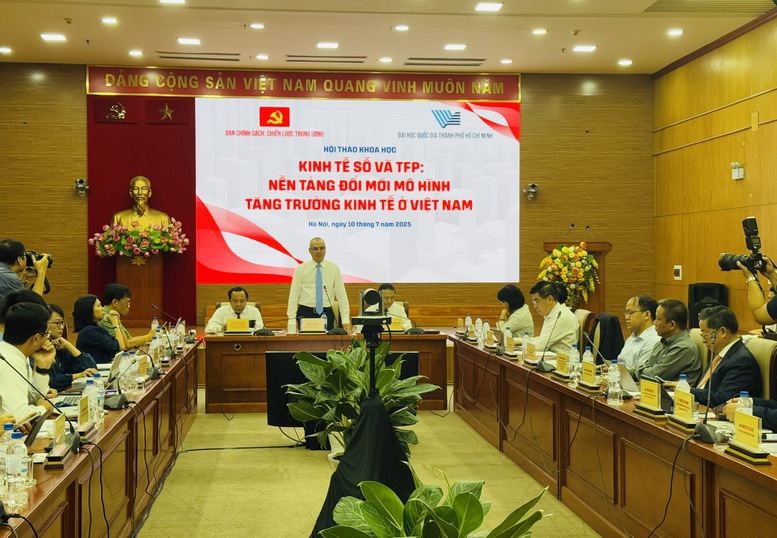
Workshop "Digital economy and total factor productivity (TFP): Foundation for innovation of economic growth model in Vietnam" - Photo: VGP/HT
TFP and digital economy: New pillars in growth strategy
On July 10, in Hanoi, the Central Policy and Strategy Committee in collaboration with Ho Chi Minh City National University organized a scientific workshop with the theme "Digital economy and total factor productivity (TFP): Foundation for innovation of economic growth model in Vietnam".
In his opening speech, Mr. Nguyen Hong Son, Deputy Head of the Central Policy and Strategy Committee, emphasized: "The model of extensive growth has reached its limit. We have no other way but to convert the model to growth based on productivity and efficiency."
Recently, the Politburo has issued many strategic resolutions, of which Resolution No. 57-NQ/TW identifies science, technology, innovation and digital transformation as key breakthroughs to improve productivity, ensure rapid and sustainable growth and maintain strategic autonomy.
According to the targets of Resolution 57, by 2030, TFP must contribute over 55% to GDP growth; the proportion of high-tech product exports must reach at least 50%; the scale of the digital economy must reach at least 30% of GDP and reach 50% by 2045.
To realize this goal, the Central Policy and Strategy Committee is developing a strategic project to achieve double-digit economic growth in the coming period - called "The era of national growth".
Deputy Head Nguyen Hong Son proposed 5 groups of issues for delegates to discuss: Improving the accurate measurement of the contribution of TFP and digital economy to economic growth; clearly identifying the key factors driving TFP in the coming period; clarifying the relationship between TFP and digital transformation in all fields; effectively promoting digital data - considered a new development resource at both national and local levels. At the same time, it is necessary to learn from international experience, especially from Singapore, the leading country in digital transformation and innovation.
From an international perspective, Professor Tan Swee Liang, Singapore Management University (SMU), emphasized: When capital and labor factors have been fully utilized, only increased productivity can help output grow. Therefore, TFP is the key driving force in the long run.
Sharing this view, Prof. Dr. Vu Minh Khuong (National University of Singapore) also said that Vietnam needs to prioritize innovation, investment in technology and institutional reform to increase TFP, promote the digital economy and break through in the global value chain.
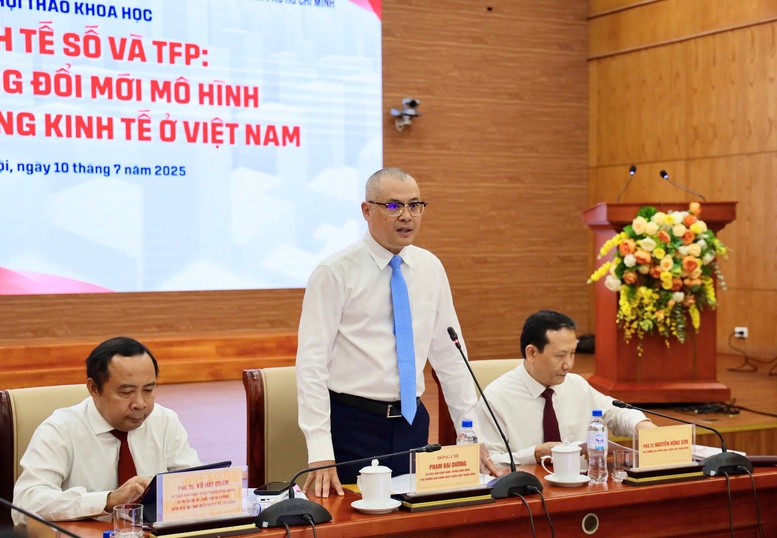
Mr. Pham Dai Duong, Deputy Head of the Central Policy and Strategy Committee, spoke at the workshop - Photo: VGP/HT
Enterprises must be the center of innovation
Dr. Nguyen Quang Vinh, a World Bank (WB) expert, provided a realistic view of the contribution of TFP in Vietnam. According to Dr. Vinh, although the proportion of high-tech goods in exports has increased sharply, domestic added value remains low.
Mr. Vinh noted that most of this value comes from the FDI sector, especially corporations such as Samsung and Dell. Meanwhile, Vietnam is still mainly involved in the assembly and packaging stages at the end of the production chain. Even in the semiconductor sector, domestic value added can be negative.
"If a business imports NVIDIA chips and then re-exports them, the net value created could be negative, because the ratio of imported goods is too high compared to the value added," Mr. Vinh gave an example:
Emphasizing the role of enterprises, Dr. Nguyen Quang Vinh said that innovative start-ups are the core force to shift from low-productivity to high-productivity areas. However, a recent survey shows that only a very low percentage of Vietnamese enterprises are above average, most of the innovations are internal.
About 80% of innovative businesses only improve existing processes, not creating new value for the market. Furthermore, investment in research and development (R&D) accounts for only 0.5% of GDP, while the target is 2%.
"Vietnam needs to promote technology diffusion and strongly encourage private enterprises to invest in R&D to escape the middle-income trap," Mr. Nguyen Quang Vinh emphasized.
During the discussion, experts from Hanoi National University, Ho Chi Minh City University of Economics and Law, University of Commerce, and leaders of technology enterprises such as Viettel, Becamex, CT Group, etc. all agreed that a synchronous innovation ecosystem is needed.
Accordingly, it is necessary to closely link the state - scientists - businesses. At the same time, developing digital infrastructure and promoting comprehensive digital transformation in education, healthcare, finance, logistics and public management is a prerequisite...
Mr. Pham Dai Duong, Deputy Head of the Central Policy and Strategy Committee, emphasized that TFP plays a very important role in assessing productivity and growth efficiency. However, it is also necessary to unify a more appropriate calculation method to ensure that when making policies, the numbers must reflect the reality.
Experts say that since Vietnam began implementing its strategy to approach the Fourth Industrial Revolution, especially from 2022-2023 until now, the emergence and strong application of AI, blockchain and other digital technologies have fundamentally changed production methods and business models. Therefore, the proposal to increase the contribution ratio of PTP to 55% is no longer too bold but has a practical and scientific basis.
The Central Policy and Strategy Committee expects to continue receiving regular contributions from experts, scientists, central and local agencies and businesses, in order to perfect the approach, measurement methods and policy mechanisms in the field of total productivity and digital economy.
Mr. Minh
Source: https://baochinhphu.vn/thuc-day-kinh-te-so-va-tfp-gop-phan-nang-suc-canh-tranh-quoc-gia-10225071014170322.htm



![[Photo] General Secretary To Lam visits Kieng Sang Kindergarten and the classroom named after Uncle Ho](https://vphoto.vietnam.vn/thumb/1200x675/vietnam/resource/IMAGE/2025/10/09/1760023999336_vna-potal-tong-bi-thu-to-lam-tham-truong-mau-giao-kieng-sang-va-lop-hoc-mang-ten-bac-ho-8328675-277-jpg.webp)
![[Photo] President Luong Cuong attends the 80th Anniversary of the Traditional Day of Vietnamese Lawyers](https://vphoto.vietnam.vn/thumb/1200x675/vietnam/resource/IMAGE/2025/10/09/1760026998213_ndo_br_1-jpg.webp)

![[Photo] Prime Minister Pham Minh Chinh chairs a meeting of the Government Standing Committee on overcoming the consequences of natural disasters after storm No. 11](https://vphoto.vietnam.vn/thumb/1200x675/vietnam/resource/IMAGE/2025/10/09/1759997894015_dsc-0591-jpg.webp)



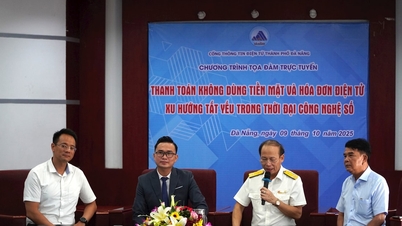






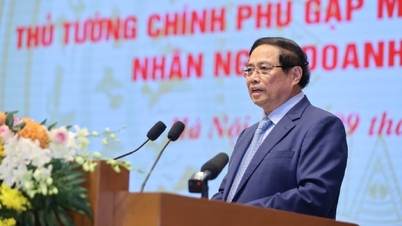





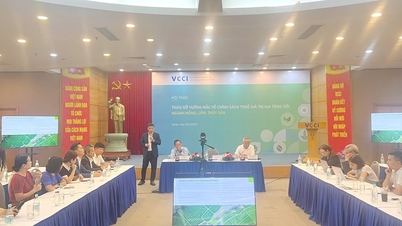




















































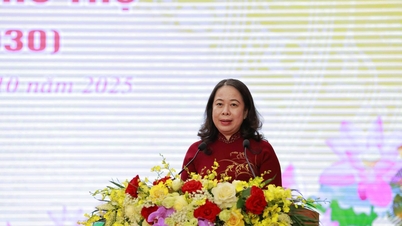
























Comment (0)